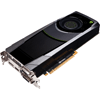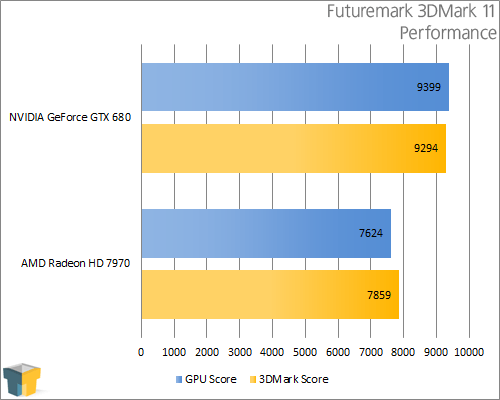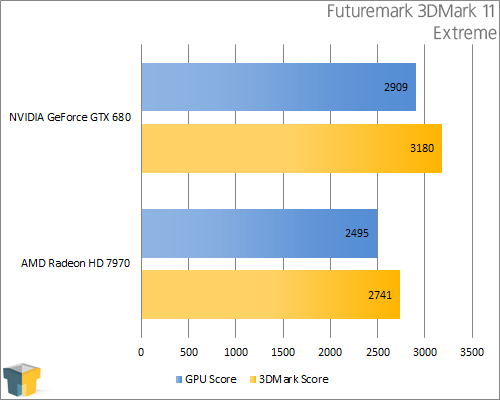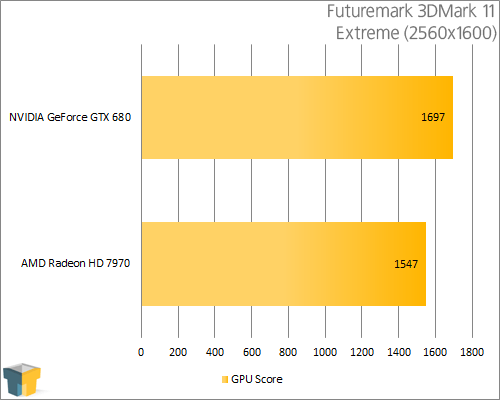- Qualcomm Launches Snapdragon 4 Gen 2 Mobile Platform
- AMD Launches Ryzen PRO 7000 Series Mobile & Desktop Platform
- Intel Launches Sleek Single-Slot Arc Pro A60 Workstation Graphics Card
- NVIDIA Announces Latest Ada Lovelace Additions: GeForce RTX 4060 Ti & RTX 4060
- Maxon Redshift With AMD Radeon GPU Rendering Support Now Available
NVIDIA GeForce GTX 680 Preview

NVIDIA’s GeForce GTX 680 is here. Based on Kepler, it’s an interesting beast. It features a reworked architecture, is produced on a 28nm process, introduces things like GPU Boost, Adaptive VSync and TXAA, has a redesigned cooler, and perhaps most important of all, aims to perform better than the competition.
Page 2 – Quick Performance Results; Final Thoughts
This past weekend, our former GPU testbed gave up the ghost, so we were forced to rebuild. In doing so, we replaced the motherboard (moving from a GIGABYTE EX58-EXTREME to a G1. Sniper), upgraded the CPU (quad-core Core i7-975 to six-core i7-990X), finally moved from a hard drive to an SSD (Kingston HyperX) and also upgraded the PSU (Corsair HX1000 to AX1200). The unfortunate thing is that this testbed doesn’t have PCIe 3.0 support, but at this point in time, and perhaps even well into the future, we don’t consider it an issue.
To help keep things simple, we haven’t gone through great lengths to disable a ton of Windows services on this testbed as we have the previous one, as over time, I’ve found doing so to be nothing more than a waste of time. We still disable major services such as Windows Update, Search, Firewall and Defender, but don’t go much deeper than that. To start off with a more lightweight OS, we’ve opted to use Windows 7 Professional N.
Here’s a quick look at the updated testbed:
|
Component
|
Model
|
| Processor |
Intel Core i7-990X Extreme Edition – Six-Core @ 4.00GHz – 1.325v
|
| Motherboard |
GIGABYTE G1. Sniper – F4E BIOS (12/12/2011)
|
| Memory |
Kingston HyperX – 12GB DDR3-1600 8-8-8-24-1T, 1.66v
|
| AMD Graphics | Radeon HD 7970 3GB (Reference) – Catalyst 12.2 |
| NVIDIA Graphics | GeForce GTX 680 2GB (Reference) – GeForce 300.99 |
| Audio |
Onboard Creative X-Fi
|
| Storage |
Kingston HyperX 240GB SATA 6Gbit/s SSD
|
| Power Supply |
Corsair AX1200 1200W
|
| Chassis |
Cooler Master HAF X Full-Tower
|
| Display |
Gateway XHD3000 30″
|
| Cooling |
Corsair H50 Self-Contained Liquid Cooler
|
| Et cetera |
Windows 7 Professional N SP1 x64
|
In our full review we’ll have a collection of current games, but for the sake of just getting this article out there, we’re including just Futuremark’s 3DMark 11 here.



Not-So-Final Thoughts
As we can see with the ultra-limited testing above, NVIDIA has a powerful card on its hands. When AMD released its Radeon HD 7970, it definitively had the fastest single GPU on the market, and I remember wondering if NVIDIA could possibly have a GPU right around the corner to put it in its place. The answer to that question as we see now, is “yes”, it did.
In our tests thus far, NVIDIA’s GTX 680 is about 10~15% faster than the Radeon HD 7970, depending on the test. It’s nothing major, but it’s still significant given the pricing.
Speaking of, AMD is pricing its HD 7970 at $549 SRP, while NVIDIA further rubs salt in the wound by pricing its GTX 680 at $499. There’s little doubt that AMD will follow-up with price-drops in the coming month; hardly atypical of any other launch in recent memory. While this is less-than-ideal for AMD, it’s a great thing for consumers. There’s always a worry that the opposing company won’t be able to deliver a truly competitive product, but we have no such thing to fuss over here.
At this point we don’t have information on when the next Kepler cards will arrive, a la GTX 660 and 670, but it’s our expectation that we’ll see them surface over the course of the next couple of months. AMD already has a full suite of HD 7000 series cards out, after all, so NVIDIA can’t rely only on its top-end card to keep consumers away from AMD. The next couple of months should be exciting.
During the media event NVIDIA held a couple of weeks ago, we were given a gameplay preview of both Borderlands 2 and Max Payne 3. While we don’t have anything to share from the former, we do have a couple of NVIDIA-provided shots from Max Payne 3.
Stay tuned for our full Kepler review next week.
Discuss this article in our forums!
Have a comment you wish to make on this article? Recommendations? Criticism? Feel free to head over to our related thread and put your words to our virtual paper! There is no requirement to register in order to respond to these threads, but it sure doesn’t hurt!
Support our efforts! With ad revenue at an all-time low for written websites, we're relying more than ever on reader support to help us continue putting so much effort into this type of content. You can support us by becoming a Patron, or by using our Amazon shopping affiliate links listed through our articles. Thanks for your support!









